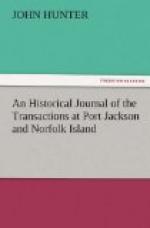The river which Governor Phillip had named the Nepean in a former excursion, was then traced for some miles, and he expected to have fallen in with it this journey, and to have traced it down to where it empties itself into the Hawkesbury, which it is supposed to do above Richmond-Hill: indeed, during the first day of this excursion, he supposed it possible that the river they were then tracing might be the Nepean, but what they saw of it afterwards, left no doubt but that they had fallen in with the Hawkesbury some miles below Richmond-Hill.
In the morning of the 16th of April, at half past seven o’clock, Governor Phillip and his party set off on their return to Rose-Hill; and, as soon as they were clear of the creek, they went south 40 deg. east, which, they supposed, would carry them into the path leading from Rose-Hill to Prospect-Hill.—The face of the country where they slept, and for several miles in their road, was a poor soil, but finely formed, and covered with the stately white gum-tree. At noon, they came to a hollow, in which they found some very good water; here they stopped near an hour: after passing this gully, and a rocky piece of ground, the soil grew better, and they soon came to a brook of good water, which they had occasion to cross twice; the soil was good, and covered with long grass: they were now drawing near to Rose-Hill, where they arrived a little before four o’clock.
The dry weather still continued, and though they had a few showers, the quantity of rain which fell in the month of April, was not sufficient to bring the dry ground into proper order for sowing the grain; a few acres, however, of what was in the best condition, were sown with wheat the last week in the month. This long continuance of dry weather, not only hurt their crops of corn very much, but the gardens likewise suffered greatly; many being sown a second and a third time, as the seed never vegetated, from the want of moisture in the soil; this was a double misfortune, for vegetables were not only growing scarce, but seed also.
The expected supply of provisions not arriving, Governor Phillip was obliged to reduce the ratio of daily subsistence; but this reduction did not extend to the women and children.
After saying that there were many of the convicts, who, if not attended to, ate their week’s allowance of provisions in two or three days; it will be obvious that the labour hitherto drawn from that class of people, must be greatly lessened by the necessity the Governor was under of reducing even that allowance; indeed, it was felt by every individual, for the daily ratio of provisions issued from the public stores, was the same to the convict as it was to the governor.
Two seamen, who had belonged to the Sirius, became settlers, and were fixed on the creek leading to Rose-Hill, where they had sixty acres of ground each allotted them, and they were to be victualled from the public store for eighteen months. A person who was sent from England to superintend the labour of the convicts, also became a settler, and one hundred and forty acres of land were allotted him on the creek: he was allowed the labour of four convicts for a year, and himself and his daughter were to be victualled from the public store for twelve months.




